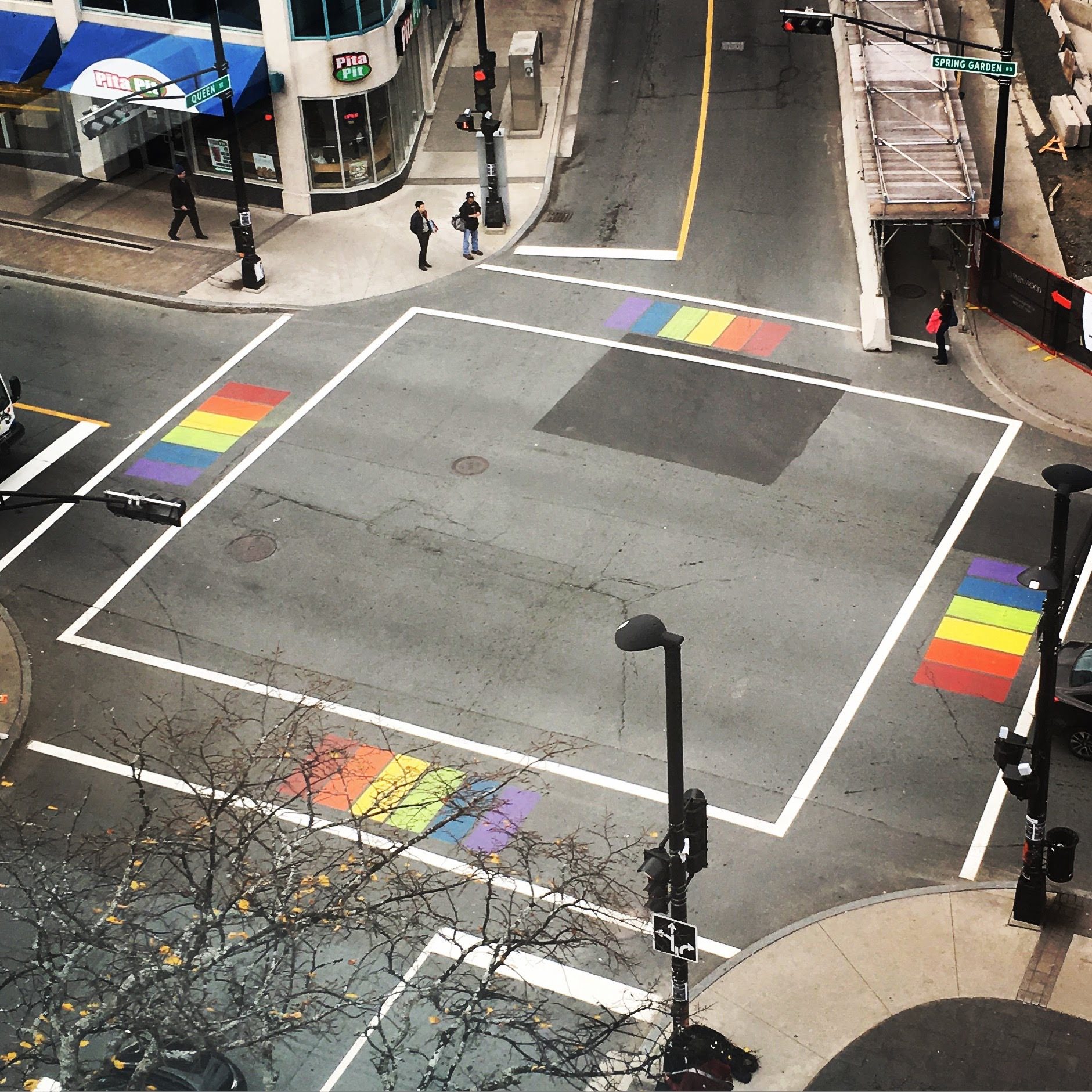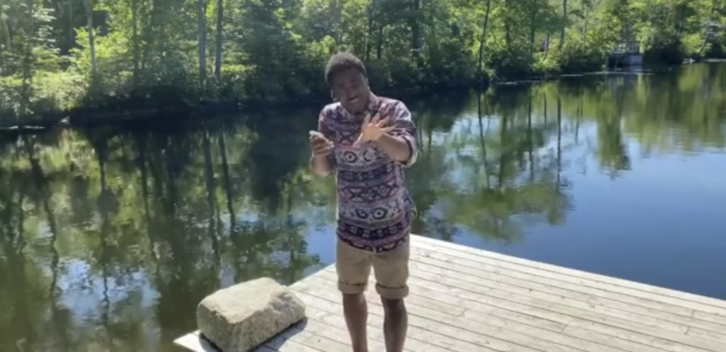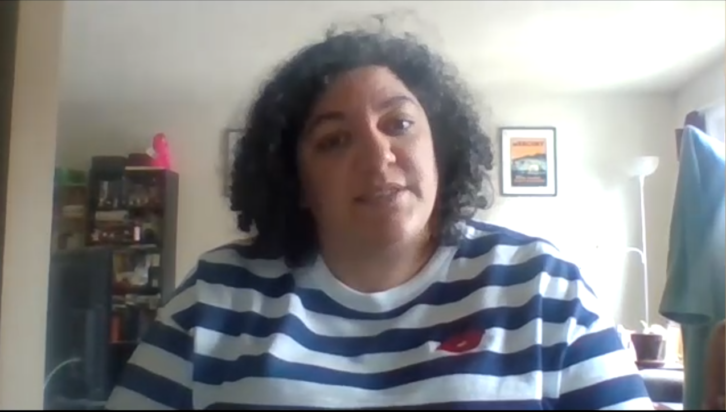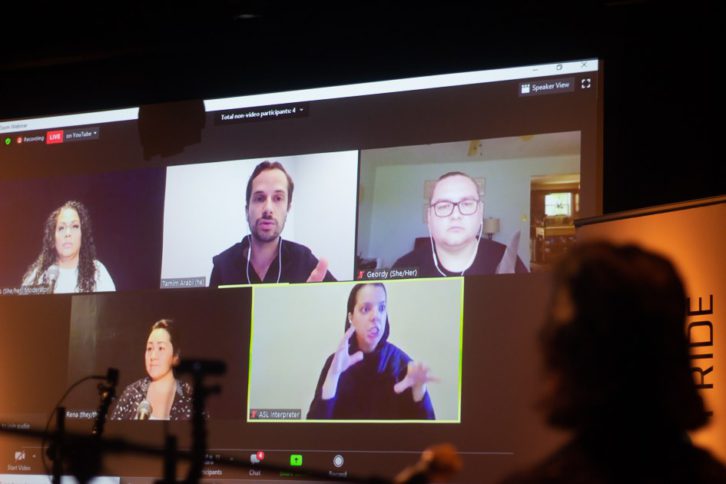Pandemic Pride

caption
Rainbow crosswalks at the intersection of Spring Garden Road and Queen Street, as seen from the Halifax Central LibraryWill the pandemic create a more inclusive and community-oriented Pride festival?
Teo Ferguson is standing on a dock on a serene lake, against a backdrop of trees. Ducks leave little triangular wakes behind them and you can see people enjoying the sunny summer weather in the distance. He’s reading a spoken word piece called “Respectability in These Streets” from a cell phone he’s holding in his hand, his free arm moving emphatically as he gives a lesson about a pioneering American activist in LGBTQ+ history.
“Just ask Marsha P. Johnson, which some of these gays forget was that Black mother who fought so you could have your rights today.”
The performance was recorded for an event called Our Artists Matter: A QTBIPOC (Queer and Trans Black, Indigenous, and People of Colour) Showcase. It was presented as part of last summer’s Halifax Pride Festival, when most events were moved online because of restrictions put in place during the pandemic.

caption
Teo Ferguson performing his poem “Respectability in These Streets” during the 2020 Halifax Pride Festival. (Screenshot)For many in the LGBTQ+ community, Pride festivals are a time of year when they can fully express themselves and, quite literally, feel proud of their identity. Same-sex marriage was legalized less than two decades ago in Canada, and even more recently in the United States. In many countries around the world, being gay is still illegal and can land a person in prison.
Almost all Pride festivals and events around the world were cancelled or postponed in 2020, as COVID brought in a year of unprecedented economic and societal change. It’s estimated that in the summer of 2020 over 500 festivals were cancelled or postponed, denying millions of LGBTQ+ people an opportunity to celebrate and connect with others.
Going online has created new opportunities and closed the door on others. It’s made things more accessible but also, in some ways, less accessible, particularly for QTBIPOC within the LGBTQ+ community. Festivals are adjusting to this new reality and, as the world heads into the second year of the pandemic, there is the question of what two years of changed Pride festivals will mean in the long term.
Pride month is June, to commemorate the Stonewall Riots in New York City which began on June 28, 1969. On that night, the police raided a gay bar called the Stonewall Inn and when the patrons resisted, it started days of protests. The event is generally considered to be the beginning of the LGBTQ+ rights movement.
The Halifax Pride Festival happens in July (Pride festivals in Canada are staggered throughout the summer so they do not overlap) and planning was already well under way for the 2020 event when the World Health Organization declared a pandemic.
The Halifax festival has grown every year, with parade attendance estimated in the tens of thousands in 2019. It is the largest festival east of Montreal and the primary one in the Atlantic region. Staff and volunteers knew that anything on the normal scale was impossible, so they reassessed and moved many events online.
Liane Khoury, the co-lead of the QTBIPOC Committee for Halifax Pride, is from Amman, Jordan and came to Canada in 2002. She has been involved with Halifax Pride for a few years, and is a founder of Queer Arabs of Halifax.

caption
Liane Khoury, co-lead of the QTBIPOC Committee of Halifax PrideShe mentions how the noon-hour panel discussions streamed last year allowed her to participate in something when otherwise she would be at work.
“I’d have the panel in the background … and it was like a thing that my partner and I did every day during Pride.”
Going online has made other events more accessible. Almost all the events (aside from a few closed spaces dealing with sensitive topics) were recorded and posted on YouTube. Some, such as the QTBIPOC showcase where Ferguson performed, have close to a thousand views – a respectable number for a local event. Analyzing the number of views gives organizers a convenient way to discover what events and topics community members prefer.
Along with the QTBIPOC Committee, Khoury is also a co-lead of the Immigrant Committee and the Health and Wellness Committee, all in addition to her day job as a mental health promoter with Nova Scotia Health. She feels like the pandemic has created a chance for “authentic community engagement.”
As an example, she mentions an event called “Queering SWANA,” which was a closed space for people from Southwest Asia and North Africa.
“I was moderating that panel. And just talking about queerness in that region, and how homophobia happened and how, like, how do we reimagine SWANA as a queer area … beautiful and with its histories and stuff like that,” she says.
“One of the folks on the panel wasn’t – isn’t – out. So we chose to have it as a closed space.”
In a closed online space, the event is advertised as usual but attendees must register in order to receive a link to the meeting. No part of the event is recorded, and nothing is posted on YouTube.

caption
Pride event at Bus Stop Theatre, simultaneously broadcast onlineClosed spaces provide their own set of complexities, whether they happen online or in real life. Khoury tells a story about two white men trying to access an in-person QTBIPOC event and causing a scene when denied entry. Ferguson speaks of online events where participants are too afraid to turn on their camera for fear of someone taking screenshots, or not knowing who else might be near a computer but not in front of a camera.
The pandemic has provided organizers of LGBTQ+ events with lessons in what works and what does not. Recently, the Immigrant Committee conducted a survey to assess the needs of LGBTQ+ immigrants in Halifax and discovered that many prefer online events over in-person ones. It was a finding that Khoury initially found surprising but showed there is no one-size-fits-all-way to reach community members.
And if your family finds out you could be in trouble Liane Khoury, co-lead of the QTBIPOC Committee for Halifax Pride
“I feel like folks are scared to be seen in certain areas, like if you’re a specifically a woman, if somebody sees you somewhere, and you’re part of the community then they’re going to ask questions. And if your family finds out you could be in trouble.’”
Ferguson, besides being a performer, is also the QTBIPOC creative programmer and facilitator at the Nova Scotia Youth Project, a non-profit in Halifax that provides support and resources to LGBTQ+ youth.
He started working with the Youth Project during the pandemic and, while he does see the downsides to events moving online, he also thinks they create new opportunities. When events happen online they can reach those outside of the city and LGBTQ+ youth in rural areas.
“When it comes to education, learning opportunities, shows and everything online, and programming online, has become great for accessing and making those things possible,” he says.
“Because I’m hoping that with enough exposure that will breed acceptance – and not tolerance – acceptance. I want to be very specific about that. Acceptance, not tolerance.”
Chris Cochrane, the vice-chair (and current interim chair) of Halifax Pride and the Trans & Non-Binary Committee lead, agrees that acceptance is important. She is a long-time activist in Halifax and performs under the name of Elle Noir. She was the 2019 Pride Ambassador and was the primary organizer of the QTBIPOC Showcase.
“Tolerance is like, ‘oh yeah, I can be in the same room with you’ but acceptance is, ‘I’m okay with being in the same room with you because I don’t really have an opinion on you. You’re who you are.’”
Because I’m hoping that with enough exposure that will breed acceptance – and not tolerance – acceptance. I want to be very specific about that. Acceptance, not toleranceTeo Ferguson
She feels that online events will become a regular part of Pride festivals, particularly as the younger generation take up more roles as event organizers. The pandemic has offered an opportunity to look to the future and, if all goes well, this year’s festival will provide more in-person events, particularly for youth.
“This is a big problem with Pride … there’s so many events for adults, but then there’s scraps for the children. The thing is that, if we want this to succeed, and to keep going, we need people that are, you know, coming to these events and understanding and being able to step into these roles.”
Ferguson acknowledges that when organizations focus on online events, it creates new challenges. An example is a situation where a young person might be unexpectedly outed to their family through their browser history or a leaked screenshot of an online meeting.
“I’m still struggling to even try and fathom how we do it in a (safer) way … how we can reach other folks who are maybe feeling that way that are outside of the city or outside in these other rural areas.”
“How do we use this as a time for exploration, and ensuring that the festival events and activities and collaboration reflect the needs of the community?”Adam Reid, executive director of Halifax Pride Festival
While many of these issues are not new, operating during a pandemic has forced many Pride organizations to reflect on how they can adapt and change.
“How do we use this time of change … to further change the festival in ways that will continue in the future?” asks Adam Reid, executive director of Halifax Pride.
“How do we use this as a time for exploration, and ensuring that the festival events and activities and collaboration reflect the needs of the community?”
Khoury sees this happening.
“I think Pride is realizing they need to be more community minded, and less like the trademark Pride like everywhere else around the world. And I think as much as a lot of folks wanted Halifax Pride to be more like Toronto (Pride), it’s kind of like that resistance – ‘but we’re not like Toronto,’ we’re more like, ‘we’re Halifax Pride, we’re different.’”
After the pandemic, she thinks Pride will have “more focus on local … what’s happening in Halifax, Dartmouth, Sackville.”
Khoury talks about her vision for Pride this year and wonders out loud if there will be a parade.
“I’m advocating for more of a march again. I feel like (the) parade is such a huge time-consuming thing … let’s bring Pride back to its roots. I’d like I feel like Pride is rethinking different things and like it’s trying to be more community minded.”
Cochrane points out that not having to worry about large-scale events like the parade or celebrity concerts, allows for more community engagement.
“It also allows us to think local, do local, be local. So that’s helped. You know, help the people that have helped you through.”
Ferguson conveys a similar sentiment that the smaller scale of events and going online might create lasting change.
“Because if the world says they love QTBIPOC people, they love queer people, they love trans people, they love Black people and Indigenous people, it shouldn’t just be when the world has seen a tragedy happen, you should be able to love us in our one-on-one personal time as well.”
About the author
Preet Bhogal
Preet Bhogal is a journalist in Halifax and has a dog named Cole. He writes about politics, health, and social justice issues.
